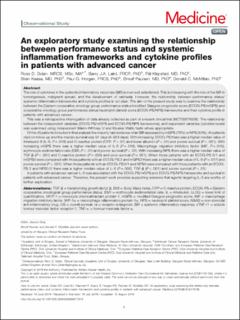An exploratory study examining the relationship between performance status and systemic inflammation frameworks and cytokine profiles in patients with advanced cancer
Dolan, Ross D.; Laird, Barry J.A.; Klepstad, Pål; Kaasa, Stein; Horgan, Paul G.; Paulsen, Ørnulf; McMillan, Donald C.
Peer reviewed, Journal article
Published version

View/
Date
2019Metadata
Show full item recordCollections
Abstract
The role of cytokines in the systemic inflammatory response (SIR) is now well established. This is in keeping with the role of the SIR in tumorigenesis, malignant spread, and the development of cachexia. However, the relationship between performance status/systemic inflammation frameworks and cytokine profiles is not clear. The aim of the present study was to examine the relationship between the Eastern cooperative oncology group performance status/modified Glasgow prognostic score (ECOG-PS/mGPS) and cooperative oncology group performance status/neutrophil platelet score (ECOG-PS/NPS) frameworks and their cytokine profile in patients with advanced cancer.This was a retrospective interrogation of data already collected as part of a recent clinical trial (NCT00676936). The relationship between the independent variables (ECOG-PS/mGPS and ECOG-PS/NPS frameworks), and dependent variables (cytokine levels) was examined using independent Mann-Whitney U and Kruskal Wallis tests where appropriate.Of the 40 patients included in final analysis the majority had evidence of an SIR assessed by mGPS (78%) or NPS (53%). All patients died on follow-up and the median survival was 91 days (4-933 days). With increasing ECOG-PS there was a higher median value of Interleukin 6 (IL-6, P = .016) and C-reactive protein (CRP, P < .01) and lower albumin (P < .01) and poorer survival (P < .001). With increasing mGPS there was a higher median value of IL-6 (P = .016), Macrophage migration inhibitory factor (MIF, P = .010), erythrocyte sedimentation rate (ESR, P < .01) and poorer survival (P < .01). With increasing NPS there was a higher median value of TGF-β (P < .001) and C-reactive protein (P = .020) and poor survival (P = .001). When those patients with an ECOG-PS 0/1 and mGPS0 were compared with those patients with an ECOG-PS 2 and mGPS2 there was a higher median value of IL-6 (P = .017) and poorer survival (P < .001). When those patients with an ECOG-PS 0/1 and NPS0 were compared with those patients with an ECOG-PS 2 and NPS1/2 there was a higher median value of IL-6 (P = .002), TGF-β (P < .001) and poorer survival (P < .01).In patients with advanced cancer IL-6 was associated with the ECOG-PS/mGPS and ECOG-PS/NPS frameworks and survival in patients with advanced cancer. Therefore, the present work provides supporting evidence that agents targeting IL-6 are worthy of further exploration.
